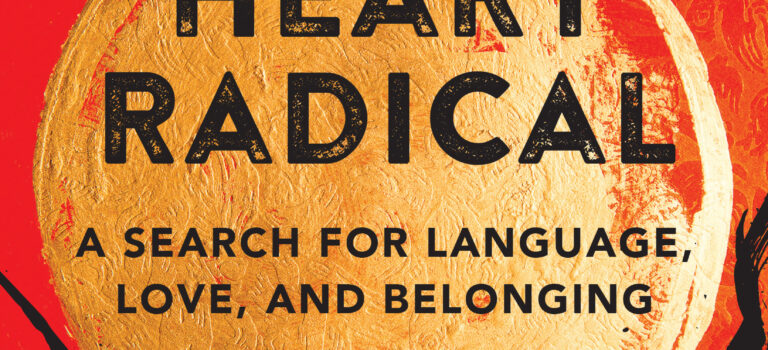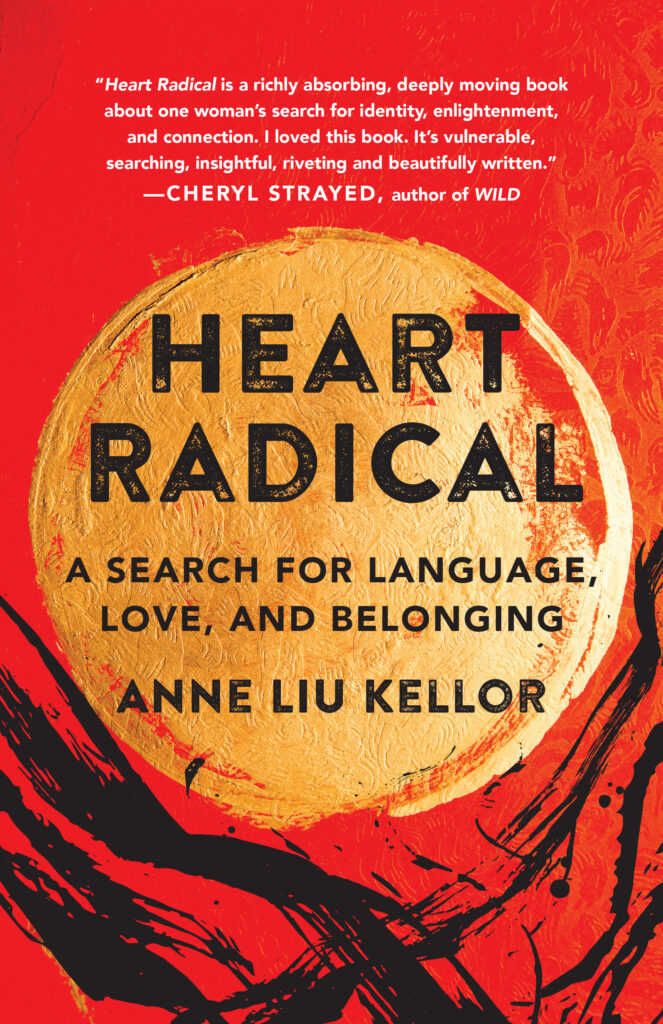We are thrilled that we recently had the chance to interview Anne Liu Kellor about her first book, Heart Radical: A Search for Language, Love, and Belonging. Heart Radical is a memoir about Anne’s experiences navigating her ethnicity, heritage, and place in this world. The interview was conducted via email by our blog editor, Sara Walker.
Sara Walker: Could you describe the inspiration for this memoir?
Anne Liu Kellor: Between 1996 and 2001, I traveled back and forth between the Pacific Northwest and China, my mother’s homeland, as well as to Tibet. Growing up bilingual, I set off as a young, twentysomething mixed-race Chinese American woman searching for my connection to my linguistic roots, as well as to my greater path in life. Underneath this, what I discovered was my desire to speak truth, to break silence, and to follow my intuition. To give voice to all the moments where I knew something in my body, but could not find the right words to own what I knew. And to give voice to how I come from a lineage of silence—of stories not told, trauma not named, feelings not expressed.
SW: Much of the book is written in present tense, but you’re recalling your past. What precipitated that choice?
ALK: Originally, I wrote a lot of the chapters as stand-alone pieces, experimenting with voice and form. Eventually it became clear that my writing in present tense felt more charged, whereas past tense got too bogged down in reflection—reflection that in some cases had not had enough time to gestate, so it could not say all that I wanted it to. As I revised the memoir over many years, my perspective on this period also kept deepening, and thus there was the temptation to keep revising, adding layers to what the story was “about.” Finally, by changing it all to present tense (and interspersing chapters that were purely backstory or more lyrical), I tried to create both a traditional arc-driven narrative of my outer journey, and hint at all of the deeper layers of spiritual questioning. All of this was a challenge because my story ultimately resisted one tidy arc and redemptive ending. It was hard for me to explain my spiritual unfolding at the time, because some of those lessons I’m still living out to this day. So while I wanted to keep the narrative focused on a certain time period, there were deeper layers I just couldn’t get to yet. The point of view choices were in part a response to this tension.
SW: I’m sure some of your past was challenging to write about. How did you navigate that? How did you get into the headspace to write in depth about your past?
ALK: Since I worked on the book on and off over twenty years (!), when I wrote a lot of the early drafts, the events I was describing were only a couple years in the past—still relatively fresh. Plus, I had a ton of journals to mine for details. Often I would first spend time reading my old journals and free-writing, and then I would find an image or scene or line that carried energy, and use that as a point of departure to begin a more crafted piece. Sometimes I played music that evoked the emotion of that period for me, and I also had the gift of long consecutive days to settle into writing. I find I need that extended silent, alone time to get a discovery draft out. Later, with all the stages of editing, I can dip in and out more easily.
SW: As we all know, the Covid-19 pandemic brought forth intensely anti-Asian-American sentiments. What was it like to work on and release this book in a year when Asian-American violence was so high?
ALK: I don’t tend to watch a lot of news or let myself get swept up in Facebook scrolling if I can help it, so while I stay abreast with headlines, I also often feel insulated from the sudden impact of the rise and fall of violence. I choose when to let it in. I don’t need to read the details to know how it impacts me; I feel the swell of pain continually, the pain of being alive in this ignorant, racist world. The ways in which all of our pain is connected. I have, however, continued to deepen my relationship to other Asian American and mixed-race writers over the last several years. I’ve offered more classes for our communities, as a way for us to share hard stories, interrogate complicated relationships, own our voices, and join the crucial conversations around race that our world is having more of these days. What does it mean to be Asian American—to be so often erased from the conversation or seen as a model minority monolith, and how can we own our inherited biases, privileges, and participation in white supremacy culture?
In implicit bias tests, Asian American women are the group that is viewed as the least capable of leadership. How have we been conditioned to see ourselves as silent or weak too? The outer violence against Asian Americans—or any racial group for that matter— starts with these kinds of fucked up biases and dehumanizing beliefs. Becoming a more visible, public writer and more fully owning the political identifier as Asian American, raises the stakes for me and my writing. I am increasingly aware of how I am a part of a lineage, and how sharing my story creates more space for other people to believe that their story matters too.
SW: In Heart Radical, you’ve captured countless experiences from your life and share them in a remarkably lyrical and straightforward way. Which memoirs and memoir authors inspire you?
ALK: A lot of my early writing was influenced by my mentor from grad school, Brenda Miller. I learned a lot from her about how to trust that images can carry deep metaphorical resonance, or that one can convey so much through juxtaposition and white space. Poets are often my favorite memoirists. So much can be encapsulated in one line—so much of what is not being said, for the reader to fill in. Recently, I’ve been super inspired by memoirs like Tastes Like War by Grace M. Cho, The Magical Language of Others by E.J. Koh, Long Live the Tribe of Fatherless Girls by T. Kira Madden, and Made in China by Anna Qu. Old favorite non-linear collage memoirs include The Chronology of Water by Lidia Yuknavitch, Another Bullshit Night in Suck City by Nick Flynn, and Safekeeping by Abigail Thomas.
SW: You’re a teacher in addition to a writer. How has your role as an educator shaped you and your writing?
ALK: So much so. In all of my courses, my students and I spend time writing together from prompts. I always participate to make sure that I stay engaged with the vulnerability and presence it takes to show up in the moment and write, then share. Teaching also keeps me actively exploring new voices and forms. Whatever I’m reading then bleeds into my own work. Writing never gets old; even if some of my thematic material can feel well-tread, there’s always a new angle or way to approach it—if I can keep experimenting and staying receptive. Also, being a teacher connects me to so many amazing writers. The work of a writer can be very isolating, so nurturing community has become increasingly important to me. It helps me remember who I am writing for and why I am doing this. Why words matter. What kind of healing and connection can be forged through the often long, slow, plodding process of shaping a piece on the page.
SW: Heart Radical is your first book. What does that mean to you?
ALK: It means it’s about f’ing time! It means hallelujah, it is finally out of my meddling hands, fears, and perfectionism, and into the world of my readers, completing the cycle from fruition to full completion. 😊 It means that I learned SO much through writing this book and revising it over the years, especially about not giving up. It means I have a really strong sense now of who I am as a writer, and I’ve also written so many essays along the way that I also have a full collection that I’m ready to publish, called Uncertainty, Trust, and the Present Moment: Essays from In Between. And I have another memoir, Artifacts of Longing, that I’ve been working on for over a decade. I suppose I now can say that I’m a writer who works on books in cycles—write, let it rest and work on something else when it is driving you crazy or being rejected, but always return, return, return. Return to that seed of trust that a story or book needs to be written. Return to what calls you back, won’t let go. Book-length memoirs especially demand their own timeline for the lessons of a longer period of life to metabolize. We may think we are “ready” or “done,” but so much of the writing—and publishing—process is also not in our control.
SW: What does your writing space look like?
ALK: I write at one end of a big room with an A-frame roof and warm cedar walls. It’s a cabin in residential Seattle, a special place, a home I inherited from my old neighbor (a part of my second memoir’s story). I look out on cedar branches, salal, Indian plum, and moss—a classic Pacific Northwest landscape. Otherwise you can find me at the window seat journaling, or propped up on my bed with my journal or looking through binders of work, music playing, incense lit. I find that when I’m not at the desk I often sink into the more emotional or poetic aspects of my work… mining for new insight or lines, connections. Whereas when I’m at my desk I’m editing on the computer and in productivity mode.
SW: What does writing mean to you?
ALK: Writing is my meditation, my daily practice. It’s work too, yes, but primarily it’s a way of being in the world—a way of paying attention, honoring small details, honoring the wide span of history and time, timelessness. Writing is a way to capture all that is hard to express, a way to revisit old wounds and heal, a way to make amends, a way to see clearly, and sometimes, to forgive. Writing can do so much. It’s a way of connecting, a way of witnessing, a way of praising and mourning, and a way of being.
SW: What advice would you give to up-and-coming Asian-American writers?
ALK: Do not be afraid to put anything down on the page in early drafts. To write what you can’t imagine yourself publishing or sharing. To write it all. To trust, that in time, with practice and community and mentorship, you will be able to name and share more. But this is a lifelong practice—you don’t have to say it all at once. You don’t have to share it with your parents. Your writing has important value, even if it just lives in your notebooks or is entrusted to a few readers. Your writing can help you grow as a human being. And yes, if you want it to, when you are ready, your writing can also challenge long-held familial silences or legacies or beliefs. Make sure you find community to share this journey with. Seek out classes and teachers who are supportive. Create writing groups with fellow students you admire. Trust that if writing truly calls to you, you won’t regret following this path. There is nothing more exhilarating than finally giving yourself permission to do what you love.
To learn more about Anne, visit her website or Twitter. Heart Radical is published by She Writes Press and available for purchase from Bookshop. Our heartfelt thanks to Anne for agreeing to the interview and sharing so eloquently!

